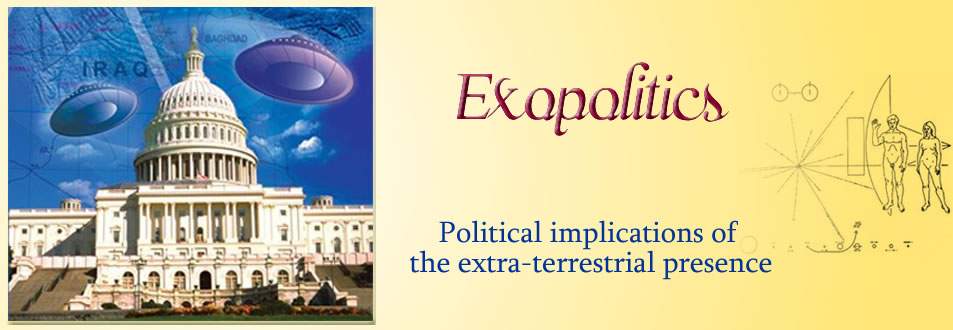Book Review: Exopolitics: Political Implications of the Extraterrestrial Presence by Michael E. Salla, Ph.D. Dandelion Books (Tempe, Ariz.), 2004, paperback, 309 pgs., $22.95
[The following review by Dr Rosemary Ellen Guiley appeared in FATE Magazine, July 2004, and is reprinted with permission.]
Controversy over the presence of extraterrestrials on earth has raged for decades. Despite claims of interviews with live ETs, downed and recovered ET craft, films and photos of strange lights in the skies, reverse engineered technology, and the testimonies of professed eyewitnesses and government whistle-blowers, conclusive proof remains elusive. But to many, the evidence exists - it's just been suppressed and hidden. According to a 2002 Roper Poll, two-thirds of American adults believe the government has not disclosed full truth about ETs.
Michael E. Salla, Ph.D., takes the
ET controversy to a new level in Exopolitics: Political Implications of the Extraterrestrial
Presence. If Salla is right, not only has there been a massive global coverup
of the ET presence on Earth, but our international conflicts and politics have
been driven by secret knowledge of, and alliances with, ETs for more than 60 years.
ETs have been a factor in World War II and even the present conflict in Iraq.
Salla speaks out for full government disclosure about ETs, and makes a case for
the need to develop an open and public policy in the emerging field of "exopolitics."
Salla is a scholar with impressive credentials in international politics,
conflict resolution and US foreign policy (see my "Gateways" column
in this issue). Exopolitics is the outgrowth of his disillusionment with conventional
models and tools for international conflict resolution. In 2001 he began to look
for alternative concepts and theories. His initial findings and conclusions were
published as study papers online in 2003.
Exopolitics discusses the
evidence for the ET presence since ancient times, drawing upon sources such as
the Book of Enoch and the work of Zecharia Sitchin. Salla explains and evaluates
the dominant conspiracy theories, their sources and the evidence in support of
them. He ranks evidence provided by government whistle-blowers and abduction/contact
reports as strong. He gives a strong/moderate ranking to witness/sighting reports
and leaked documents (such as the MJ-12 papers), and a weak ranking to evidence
provided by channeling. In between are sources such as remote viewing and independent
archaeology.
Salla acknowledges up front that he is not out to prove
the ET presence. He makes his case and goes on from there to discuss the global
political ramifications of ETs. The visitors have a variety of agendas, from one-world
domination plots to helping humanity. Some ETs present more of a threat than a
help, regarding humans and their planet as resources to be used and harvested.
The most controversial material in Exopolitics revolves around modern global
politics. According to Salla, the Nazi government established contact with ETs
in the 1930s and received advanced technology help. They recovered crashed ET
craft, and they undertook expeditions to Antarctica to build secret ET-related
bases. The Allies came into knowledge of this, and thus the politics and warfare
of World War II were driven by the need to control ET technology and activities.
The foundations were laid for the secret global management of the ET presence.
ETs have infiltrated global clandestine organizations. Salla holds that America's
real motive for invading Iraq is the discovery and control of ancient "stargate"
sites left by the sky god ETs. The stargates enable time and space travel.
Despite the conspiracy, individuals have the ability to take power into their own hands by establishing their own direct contact through telepathic and empathic means. Lifestyle changes incorporating meditation, diet, alternative health practices and "harmonious social relationships" will foster this ability. If enough people establish their own contact, the conspiracy will be forced to reveal itself.
Salla provides extensive footnoting - 574 references
in all - and the mix of sources includes many who are controversial themselves.
Readers who are new to this field will especially appreciate the book's scope
and background information.
Exopolitics is likely not to convince skeptics
of the ET conspiracy, who will find it hard to imagine that such an extensive
conspiracy could be so effectively squelched worldwide for decades. Those who
are willing to be open to Salla's ideas will find Exopolitics thought-provoking.
At the very least, Salla opens a door to a different and potentially deeper discussion
of the ET presence, and gives momentum to the case for full disclosure.
-
Rosemary Ellen Guiley


